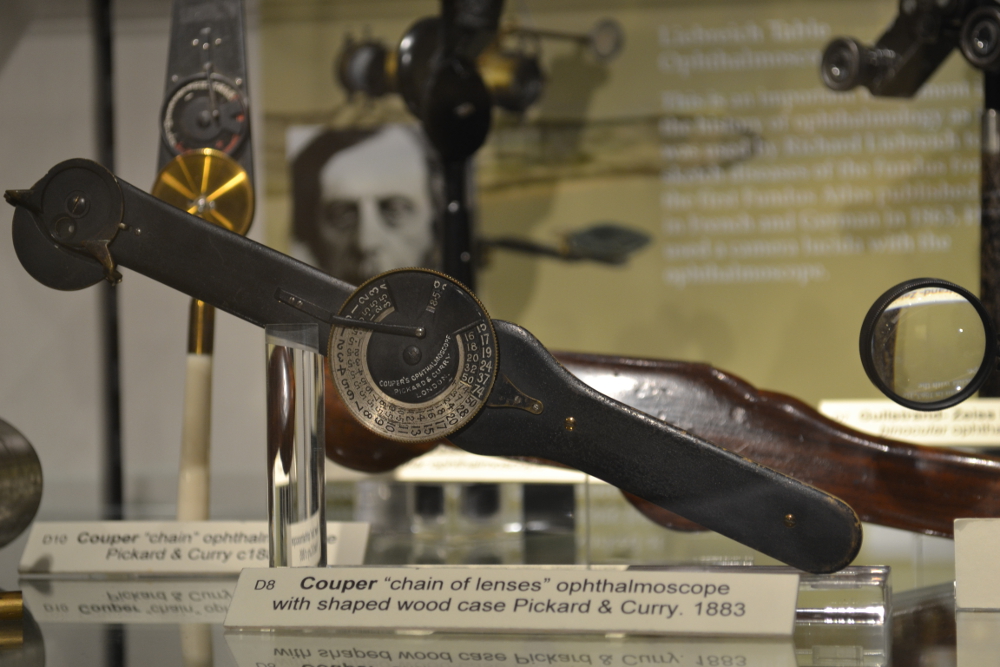The College was originally formed from the Ophthalmological Society of the United Kingdom and the Faculty of Ophthalmologists. The Society, founded in 1880 by Sir William Bowman, had held a scientific meeting every year with only a few exceptions during the Second World War. The Faculty, formed in 1946 by Sir Stewart Duke-Elder, was the professional organisation for ophthalmologists. The Royal Charter creating the College of Ophthalmologists was granted on the 14 April 1988 and the Royal Licence was granted five years later.
The museum houses thousands of artefacts that provide a rich history of the instruments, innovations and patient care over the last 300 years. At the College, there are glass cabinets that display some of the artefacts. The antiquarian books, numbering over 600, go back to the early part of the 17th century. The collections are not open to public but can be viewed by appointment. The Honorary Curator welcomes enquiries on any aspect of the history of ophthalmology, please direct your enquiries to [email protected].
The collections have largely been built up over the years through donations. Offers of equipment and books are welcome but with limited space only items that fill an important gap in the collections can be accepted.
Short History of Ophthalmology
It was not until the beginning of the 19th century that ophthalmology began to be recognised as a speciality in its own right in the United Kingdom.
Until then operations on the eye, mainly for cataract, had been performed by general surgeons and it had a poor reputation. In addition the situation was not been helped by itinerant “oculists” who practiced their art on an unsuspecting public, the best known of these being the quack John Chevalier Taylor.
In 1805 John Cunningham Saunders founded the first specialist eye hospital. This was to become known as Moorfields. Both he and his successor Benjamin Travers established ethical standards that enabled ophthalmology to become a respected profession.
Mention has already been made of Sir William Bowman and the founding of the Ophthalmological Society of the United Kingdom in 1880. This was an enormously important event. For the first time ophthalmologists had a central organisation that provided a platform for learning through meetings and the presentation of papers. Bowman’s influence was not confined to the UK. He was an international figure who with Frans Donders, Albrecht von Graefe and Hermann von Helmholtz’s, through the invention of the ophthalmoscope, accelerated beyond measure the progress of the ophthalmological profession.
Undoubtedly the use of anaesthetics and Lister’s sterilisation of instruments and the operative area were the most significant advances in surgery in the 19th century and ophthalmology was to benefit greatly from these discoveries.
Ophthalmologists today only have to look at the display of 19th century instruments the College’s collection to see how far the profession has come since those days.
Hugh Williams: Ophthalmology Documentaries
Hugh Williams, an Honorary Consultant Surgeon at Moorfields Eye Hospital, has created a series of documentaries charting the history of ophthalmology.
Casanova and the Spitfire Pilots
Casanova and the Spitfire Pilots recounts the enormous difficulties pioneer ophthalmologists overcame in the successful evolution of modern cataract surgery and the development of the intra-ocular lens. The author, Hugh Williams, knew personally many of these men including Dr Charles Kelman and Sir Harold Ridley.
The Olympian Ophthalmologist
The Olympian Ophthalmologist is the biography of Henry Stallard. World famous as a surgeon, scientist, army doctor, author, artist and athlete, he was probably the most multi-talented of modern-day ophthalmologists. The film shares Stallard’s hitherto unseen memorabilia and celebrates the 25th anniversary of the College.
Turning a Blind Eye: A Story About Strabismus
Turning a Blind Eye is a tribute to John Lee, late President of the Royal College of Ophthalmologists. It presents strabismus from the sociological and historical side, omitting any didactic surgery but using unusual and entertaining illustrations. It also pays tribute to the development of the orthoptic profession.
©2017 The Royal College of Ophthalmologists. No part of any of the videos shown on this page may be reproduced, distributed, or transmitted in any form or by any means, without the prior written permission of the copyright owner. Please contact [email protected] for more information.

